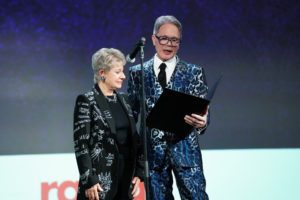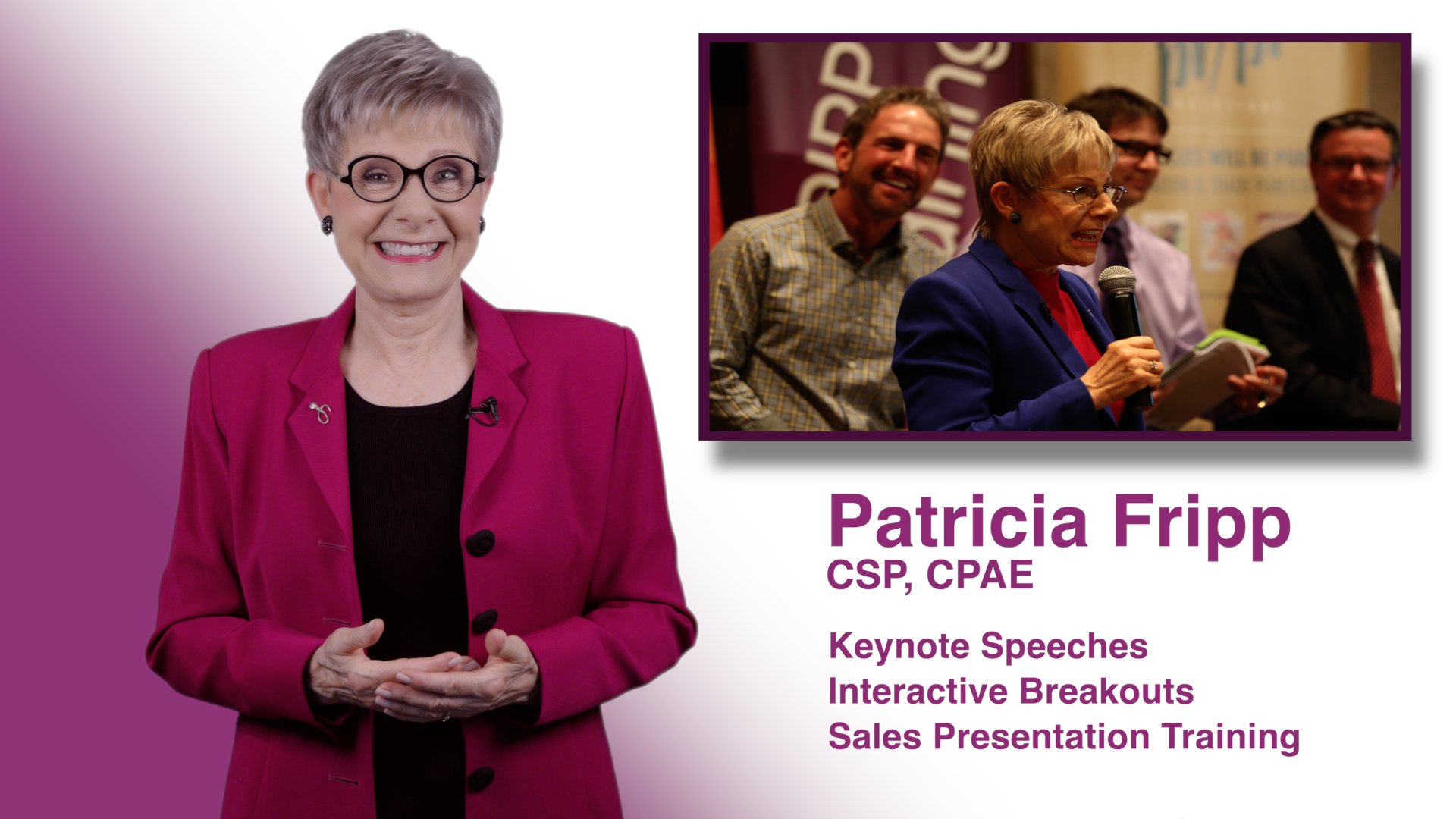Tips on How to Give an Acceptance Speech
Accepting an award is like walking a tightrope. You need to be gracious, grateful, and humble, yet not so humble or self-deprecating that the audience thinks you are trivializing the honor.
In May of 2022, Dan Maddux, my best long-time client and Executive Director of the American Payroll Association honored me with their inaugural Partner of Excellence Award. This was presented at the opening General Session. Dan told the audience, “This award is for Patricia’s 30 years of contributing to the leadership development and presentation skills of APA’s members and leaders.”
Although Dan told me I could take as long as I wanted, it was more appropriate to be short and sweet.
In my short presentation, I said, “It is a privilege to be honored for my contribution to the success of others. For decades, I have sat in the audience and felt like a proud parent as I watched APA members and leaders deliver powerful and important presentations. Thank you for the award. As long as you invite me, I look forward to being with you.”

Often, you can have more impact with a well-crafted three- to five-minute speech than you can with 45 minutes. However, every word must count. Consider this a cameo appearance.
With another client, I was coaching a highly-visible member of their association who was due to receive their highest award. The organization has over 100,000 members. Two thousand people would be in the audience.
He told me, “I want to be funny, so I’ll start by saying how desperate they must be to give me this award.” In no uncertain terms, I persuaded him that this line was not funny, and that he would be insulting everyone who had been honored with this award. We worked together to come up with a gracious acceptance speech, still funny, that would leave the audience feeling great about the event, the award, and the organization.
Sooner or later, you’re probably going to be presented with an award.
It may be a surprise, or you may have time to prepare. Use your answers to the following questions to weave a warm, wonderful story that will leave everyone with a big smile and perhaps a tear.
- Who invited you to join this group or encouraged you to get involved in this project or event?
- What is your most personal connection to this group?
- How do you feel about the people, the organization’s goals, or its mission?
- Why are they giving you this award?
- When was the first time you attended a meeting, and what were your experiences?
- Have you seen someone else accept this same award?
People will not remember all the details of what you say, but they will remember the stories you tell.
Include a memorable story or incident, something entertaining or touching about your connection.
Dan Maddux, Executive Director of APA, received the Meeting Partner of the Year award from the National Speakers Association. His acceptance speech was one of the highlights of the convention.
First, he said he was honored.

Second, he said what his audience loved hearing: “I consider professional speakers to be my partners and my best investment in the success of my conventions.”
Third, he told a story about a much-loved NSA member, Jeanne Robertson, and how she had educated him.
“You know, Dan, most popular speakers like me, have more than one speech. Your audience loves me. You can keep bringing me back.” Dan reenacted their conversations, imitating her southern accent. One of Jeanne’s claims to fame is her height. She told her thousands of audiences she was 6’ 2” with her hair mashed down. Dan, a tall man, pretended he was looking up at her. That brought the house down.
As a speech coach, I am often disappointed with the quality of acceptance speeches from celebrities we love and admire. It is especially disheartening when we have seen them deliver magnificently long pieces of dialogue in movies and on the stage.
In general, Academy Award speeches are not the best examples of great acceptance speeches. There are, however, some memorable ones.
A few of my personal favorites:
When Russell Crowe won an Oscar for The Gladiator (2000), he dedicated it to “Everyone who has seen the downside of disadvantage.” Then he won the 2002 Golden Globe Award for A Beautiful Mind. First, he gave credit to the characters in the film, offering special thanks to “John and Alicia Nash, for living such an inspirational love story.” He added, “A Beautiful Mind is just a movie, folks, but hopefully it will help us open our hearts to believe that something extraordinary can always happen in our lives.” Wow!
It’s okay to be excited. The audience is on your side.
Sally Field’s joy when she won the 1979 Academy Award for Norma Rae has never been forgotten: “You like me! You really like me!” And when she won the 1987 Oscar for Moonstruck, Cher said, “I know this does not mean I am somebody, but I am on my way to becoming somebody.” I quoted her when I won the 1996 Cavett Award, the highest award offered by the NSA.
In 2002, action star Harrison Ford was honored with the Hollywood Foreign Press Association’s Cecil B. DeMille Award for “Outstanding Contribution to the Entertainment Field.” Or more specifically, 35 movies over four decades, including Star Wars, Raiders of the Lost Ark, Witness, The Fugitive, and Patriot Games. “In anticipation of tonight,” he said, “I wrote two speeches, a long one and a short one. I’ll give you the short one, ‘Thank you.’ It seems there might be enough time for the long one as well, which is, ‘Thank you very much.’”
Hilary Swank, Best Actress, Million Dollar Baby, gave hope to so many watching at home with, “I’m just a girl from a trailer park who had a dream. I never thought this would ever happen.”
Sidney Poitier, Best Actor, The Defiant Ones, reminded us to keep going with, “It has been a long journey to this moment.”
Lupita Nyong’o, Best Supporting Actress, 12 Years a Slave, said, “When I’m being true to myself, I can avail myself to extraordinary things such as this. You have to allow for the impossible to be possible.”
Oscar examples that make the speech bigger than the recipient.
Elizabeth Taylor accepting the Jean Hersholt Humanitarian Award, said, “I call upon you to draw from the depths of your being to prove that we are a human race. To prove that our love outweighs our need to hate. That our compassion is more compelling than our need to blame. That our sensitivity to those in need is stronger than our greed.”
Meryl Streep, Best Actress, The Iron Lady, said, “This is such an honor. But the thing that counts the most with me is the friendships, and the love, and the sheer joy we have shared making movies together.”
Steven Soderbergh, Best Director, Traffic, said, “I want to thank anyone who spends part of their day creating. I don’t care if it’s a book, a film, a painting, a dance, a piece of theatre, or a piece of music. Anybody who spends part of their day sharing their experience with us. I think the world would be unlivable without art.”
Halle Berry, Best Actress, Monster’s Ball, said, “This moment is so much bigger than me. This moment is for Dorothy Dandridge, Lena Horne, and Diahann Carroll. It’s for the women that stand beside me: Jada Pinkett, Angela Bassett, Vivica Fox. And it’s for every nameless, faceless woman of color that now has a chance because this door tonight has been opened.”
Whenever you have advance notice, be sure to ask how long you are expected to speak.
The shorter your time slot, the more every word counts. When the time comes, look directly at the audience. Although you most likely will have a script, rehearse it often enough that you only need the script for confidence. Never read your first few lines; that is when you need to look at your audience and smile. In case you need to glance at notes, make sure they are printed in a large font and written one sentence at a time down the page rather than in paragraphs. If you need a reminder, this will make it easier to find your place.
Whenever you are involved in leadership in your professional organization, in your community, or in philanthropy, one day you are likely to get an award. It’s better to have a few well-crafted remarks ready rather than be caught speechless.
Now you know how to accept an award. Be gracious. Be modest. Be prepared!
“Patricia, words cannot express the gratitude I have for your superb scripting and speech coaching for my important acceptance speech. Needless to say, everybody told me, ‘The speech was awesome!!!’ It was obvious the entire audience was blown away and greatly impacted. The enthusiasm came from those who knew me and those encountering me for the first time. To think, from our first call to a memorized speech in four days. Thank you for your talent, care, friendship, and support! It truly means the world!” Kristopher Francisco
![]() Become a great presenter quickly, easily, and cost-effectively on your own schedule. I’m here for you 24/7 through Fripp Virtual Training.
Become a great presenter quickly, easily, and cost-effectively on your own schedule. I’m here for you 24/7 through Fripp Virtual Training.
“I wanted a super bowl-quality coach, and I was lucky to be introduced to Patricia Fripp. Her help in coaching and scripting was world-class. With Patricia Fripp on your team, you can go places.”
– Don Yaeger, Long-Time Associate Editor for Sports Illustrated magazine, Award-Winning Keynote Speaker, 13-time New York Times Best-Selling Author
Patricia Fripp was interviewed for this article on acceptance speeches for Toastmasters magazine.
April 2021 Toastmasters magazine


Thanks for this article. Won my first award and this is helpful, but alas I still have to figure out what to say:)
It’s all about showing gratitude to everyone who helped you receive the award.
Thank you for this article. Won my first award in my school!
Patricia: Thanks for this post. It gave me a road map for my remarks, and I was the better for it.